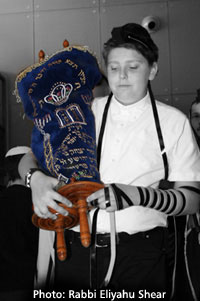 Identifying as a Jew
Identifying as a Jew


7 min read
Extracting the significance behind the party.
None of the highlights of my son's Bar Mitzvah took place at the Bar Mitzvah.
The first one occurred a month before the Bar Mitzvah, when my son Yisrael Rohn donned tefillin for the first time. Although the daily mitzvah of tefillin, like all the commandments of the Torah, would become incumbent upon him only when he reached the age of 13, the custom among Ashkenazi Jews is for a boy to start practicing putting on tefillin 30 days earlier.
 We chose to mark the event at the Kotel -- the Western Wall, Judaism's second holiest site (next to the Temple Mount). With his whole class in attendance and his father at his side, Yisrael Rohn bound the straps around his head and his left arm, so that the boxes containing the Scriptural passages commanding him to love and serve God were mounted firmly on his head and opposite his heart.
We chose to mark the event at the Kotel -- the Western Wall, Judaism's second holiest site (next to the Temple Mount). With his whole class in attendance and his father at his side, Yisrael Rohn bound the straps around his head and his left arm, so that the boxes containing the Scriptural passages commanding him to love and serve God were mounted firmly on his head and opposite his heart.
Seeing the straps coiled around my adolescent's arm, I was moved to tears. Whatever else we had given him in his life, this endowment was the most precious. We had given him purpose and boundaries. We had given him a goal to endow his life with meaning -- as defined in the boxes of the tefillin -- and we had given him boundaries -- the straps -- to direct and discipline his life.
That night when my son went to bed, I sat with him for a few minutes in his darkened room. I had been moved by the morning's event, but I wondered what it had meant to him. Sitting on the edge of his bed, I asked him what he thought was the purpose of his life.
"To fulfill my mission," he replied.
"And what is that?" I queried.
I was gratified that at least he has a sense of life as imbued with mission.
"I don't know yet," he answered honestly. I smiled. Most people three times his age are not yet clear about the particular mission they have been assigned to accomplish in this world. But I was gratified that at least he has a sense of life as imbued with mission, rather than an aimless meandering.
Even before I asked, as I watched him that morning lace his tefillin around his arm for the first time, I knew that he knew that life has a lofty purpose.
BECOMING A GIVER
The second highlight occurred one week before my son's Bar Mitzvah, when my husband and I accompanied Yisrael Rohn to the Jerusalem office of Yad Eliezer.
All of us had been feeling queasy about the amount of money the Bar Mitzvah was costing. Even without frills -- no flowers, a two-piece band, the least expensive good caterer we could find -- the expenses were mounting. Keenly aware that there are multitudes of poor boys in Israel whose families could afford neither celebration nor even tefillin, we decided to join Yad Eliezer's "Donate a Bar Mitzvah" program.
Milka Ben Zimun, the coordinator of Yad Eliezer, greeted us enthusiastically. She had found the perfect recipients for our $1,000 donation. The first boy was a child of an abusive father. The mother had finally taken her children and fled to a shelter. Struggling to support her children, the mother had no money for a Bar Mitzvah celebration. A bare-bones party for 50 people -- the boy's classmates and close relatives -- would cost $500.
Yad Eliezer's "Donate a Bar Mitzvah" program usually entails $500 for the party and $500 for tefillin for one boy, but this particular boy's grandmother had wrangled him up tefillin, so, Milka explained, the second half of our donation would go to buy tefillin for a different boy.
This second boy's father had been seriously injured while fighting in the Israeli army and was permanently crippled. The State of Israel had awarded him a generous sum, which he used to buy an apartment. With seven children in the family, their monthly income was insufficient to shoulder the extra expense of a set of tefillin. That would be our gift.
As Yisrael Rohn handed Milka our check for $1,000, all of us were choked up. Before his Bar Mitzvah, when he looked forward to getting an abundance of presents, our son was first defining himself as a giver.
As we got back into our car, Yisrael Rohn announced that he wants to give 10% of the money he receives for his Bar Mitzvah for Dov's 11-year-old son. Dov works shlepping fruits and vegetables for our local produce store. His wife has been in a coma for many years, leaving their only child Yosef virtually motherless. Yisrael Rohn had the idea to use the tithe from his Bar Mitzvah haul to send Yosef (whom he has never met) to summer camp.
THE LAMP
The Bar Mitzvah celebration took place a week later. Love, joy, and blessings flowed abundantly. The third highlight for me occurred a few hours afterward, back at the house, when Yisrael Rohn was opening his presents.
Among the piles of books, checks, and sundry amusements (an iPod, a tent, a couple games), sat a box with the handwritten warning, "FRAGILE!" Yisrael Rohn unwrapped its layers of bubble paper to reveal an earthenware oil lamp, about the size of his palm. The accompanying letter from our friends the Jaffes testified that the lamp dates back 2,000 years, to the first century C.E. It was found in central Israel, and had belonged to a Jew. How did they know? The letter explained:
You will notice that the center of this lamp is broken out. That's because when the Romans made lamps like this, they included pictures of pagan deities, which were unacceptable to the Jews. So, when a Jew wanted to use the lamp, he first broke off the picture. He had to separate himself from the foreign influence which he knew was bad for him. So, we see that in ancient times it was no different for a Jew than it is today... As it was for our ancestors, it is for us also.
In awe, I gazed at the ancient lamp. It had belonged to a Jew, living here in the Land of Israel, like my son, 2,000 years ago.
The ancient oil lamp connected my son to all the other Jews throughout time.
Yisrael Rohn is not the first son in our family to be born in the Land of Israel. Our family began to put down roots here over three millennia ago. Here they lived their lives, birthed their children, and celebrated their Bar Mitzvahs and weddings. From here they were exiled and began their long wanderings through Europe, Russia, Romania, and eventually America.
And now we have returned. Yisrael Rohn is the first son in our family to be born in the Land of Israel in some two millennia. And now he possesses an oil lamp that connects him to the Jews who preceded him in this place.
Bar Mitzvah focuses much attention on the individual Bar Mitzvah boy. In a very real sense, he comes into his own on this occasion. But Bar Mitzvah also marks the boy's becoming a full-fledged member of the Jewish community. He can be counted in a minyan (quorum of 10); he can say prayers and perform mitzvot on behalf of other Jews. Bar Mitzvah, ideally, should connect the boy to all the other Jews throughout the world.
The ancient oil lamp connected my son to all the other Jews throughout time. A highlight indeed.
Sara Yoheved Rigler will be speaking in the U.S. in June. For a complete schedule, click here.
